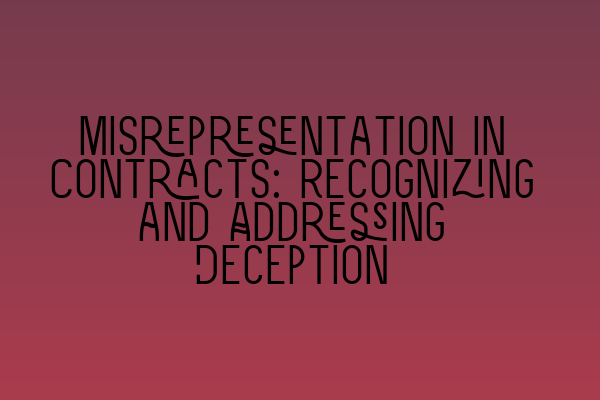Misrepresentation in Contracts: Recognizing and Addressing Deception
In the world of contract law, misrepresentation is a deceitful act that occurs when one party to a contract makes false statements or conceals important information to induce another party to enter into the contract. Misrepresentation undermines the fundamental principles of contract formation, such as mutual assent and good faith, and can have serious legal and financial consequences for the innocent party.
Recognizing and understanding misrepresentation is crucial for all participants in contractual relationships, including solicitors, potential clients, and individuals entering into contracts. In this blog post, we will explore the concept of misrepresentation in contracts, its different forms, and how it can be addressed legally.
Forms of Misrepresentation
Misrepresentation can take various forms, each with its own legal implications. It is important to be familiar with these forms to detect and respond to potential deceptive practices effectively. The three primary forms of misrepresentation are:
- Fraudulent Misrepresentation: This occurs when a party knows that a statement made is false or acts recklessly without caring whether the statement is true or false. Fraudulent misrepresentation is a serious offense and may lead to criminal charges in addition to civil liability. To learn more about legal conflicts and an effective approach to resolving them, read our article on Exploring Alternative Dispute Resolution: An Effective Approach to Legal Conflicts.
- Negligent Misrepresentation: In this form, a party unintentionally makes false statements due to their unreasonably careless behavior or a lack of reasonable grounds for making the statement. While there is no intent to deceive, the innocent party can still seek remedies for damages caused.
- Innocent Misrepresentation: This occurs when a party makes false statements believing them to be true without any knowledge of their falsity. Although innocent misrepresentation may not carry the same level of liability as fraudulent or negligent misrepresentation, it can still result in rescission or damages depending on the circumstances.
Addressing Misrepresentation
If you believe you have been a victim of misrepresentation, it is crucial to take appropriate legal action to protect your rights and interests. Here are the steps you can take to address misrepresentation:
- Document the Misrepresentation: Keep a detailed record of all the communications, documents, and evidence related to the misrepresentation. This will be crucial in proving your case and supporting your claims in court.
- Consult with an Experienced Solicitor: Seek legal advice from a qualified solicitor who specializes in contract law and misrepresentation cases. An experienced solicitor, such as those at SQE Contract Law, can guide you through the process and provide expert representation throughout the legal proceedings. To learn more about the skills every solicitor should master, read our article on The Art of Contract Drafting and Negotiation: Skills Every Solicitor Should Master.
- Consider Remedies: Depending on the nature and severity of the misrepresentation, you may be entitled to various remedies. These can include rescission (canceling the contract), damages (compensation for financial losses), or specific performance (forcing the breaching party to fulfill their contractual obligations).
- Engage in Negotiation or Mediation: Before resorting to litigation, explore the possibility of resolving the dispute through negotiation or mediation. Alternative dispute resolution methods can save time, money, and maintain important relationships. To learn more about alternative dispute resolution, read our article on Exploring Alternative Dispute Resolution: An Effective Approach to Legal Conflicts.
- Initiate Legal Proceedings if Necessary: If attempts at negotiation or mediation prove unsuccessful, your solicitor can help you file a lawsuit and initiate legal proceedings to pursue your rights. The litigation process will entail presenting evidence, engaging in pre-trial procedures, and advocating for your position in court.
Remember, addressing misrepresentation requires prompt action and the assistance of a skilled solicitor. By recognizing and responding to misrepresentation appropriately, you can protect your legal rights and seek appropriate remedies.
If you would like to learn more about the path to becoming a solicitor and essential skills in the legal field, read our related articles:
- Mentorship for Aspiring Solicitors: Nurturing Talent in the Legal Field
- The Art of Contract Drafting and Negotiation: Skills Every Solicitor Should Master
- Navigating the Legal Practice Course (LPC): Your Path to Solicitor Qualification
- Mastering Client Care Skills: Essential for Solicitors
If you require legal assistance regarding misrepresentation or any other contract-related matter, contact SQE Contract Law today. Our team of experienced solicitors is ready to provide you with comprehensive legal advice and representation.
